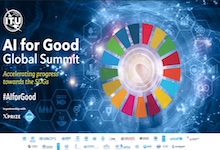AI empowering smart citizens
17 May 2018 02:00h
Event report
The session AI Empowering Smart Citizens, moderated by Mr Alexandre Cadain (Co-Founder & CEO at ANIMA; XPRIZE Ambassador), stressed the need for strengthening and expanding smart cities and smart communities.
The first speaker, Mr Joaquin Rodriguez Alvarez (Professor and Researcher EPSI-UAB, Leading Cities Coordinator), said that technology had a lot of promise, but that it does not come without its share of problems. It is therefore necessary to be prudent when it comes to the development and applicability of artificial intelligence (AI). Furthermore, he stressed the importance of data management through two radical examples. First, he recalled the use of data during the Holocaust; second, he spoke about the role that data played in the extermination of a part of the population in Rwanda. He argued that it is not possible to completely trust either the private sector, nor the public one. Today, it is easy to manipulate the public opinion and negatively affect democracy with the tools we have available. It is crucial to be careful with digital technologies and AI.
Rodriguez Alvarez further stated that the concept of ’empowering people’ is based on the notion of sharing knowledge and awareness. Finally, he stressed that technology is not neutral, but that it ‘learns’ from the society it is installed in. The main concerns in this regard are related to, but not limited to lethal autonomous weapon systems (LAWS). Human dignity has to be taken into account in the development and application of these technologies: technology is used by humans who can have peaceful or hostile purposes.
Mr Jacques Ludik (Founder & CEO, Cortex Logic; Founder & President, Machine Intelligence Institute of Africa (MIIA)) focused on how to use technology for better development and problem-solving. The talk covered the topics of health, water, smart education and smart technology services for African smart cities. He first discussed the inclusion of AI in the community, and a data platform for Africa. On the issue of health data and analytics ecosystems for Africa, MIIA is collaborating with private companies in order to operationalise health systems. Ludik also touched upon the need for smart education in Africa, in order for Africa to be play an active role in the 4th industrial revolution. He then continued his intervention by attempting to define smart citizens as those who put responsibilities first. Finally, he concluded by saying that empowering smart citizens in a new way involves: bottom up decision making, non-linear approaches, encouraging complexity, embracing uncertainty, enabling and boosting creativity.
The moderator then opened the floor for the presentation of three projects that were then discussed by the panellists and the audience. The first project focused on empowering homeless people in line with sustainable development goals ( SDGs) 8 and 11. The project plans to provide smartphones through which people provide data that governments and international organisations can use for more effective actions. The second project focused on managing cars as a common good. One of the direct effects of the project is saving urban space by car-sharing. People can change their concept of mobility and the way they behave. Finally, the third project was about an inclusive innovation roadmap, meant to incentivise investments in AI and to include the following points: enhance city operations, connect citizens with the city government, implement open data, close the digital divide and make Internet access a public good. In line with the SDGs’ values, the project satisfies the P4 concept: people, planet, performance and place. In the final comment of the session, the opportunities of blockchain were discussed as a means of empowering citizens.
Related topics
Related event

